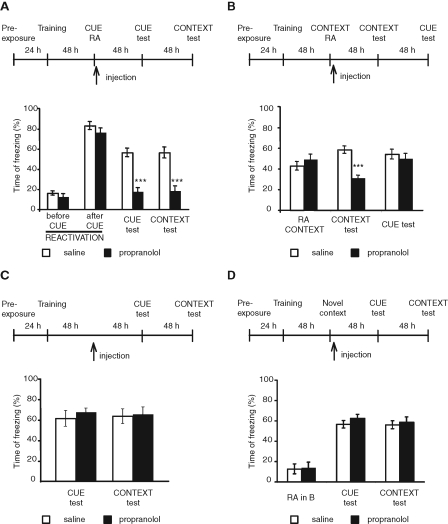Figure 2.
Propranolol administered systemically after reactivation disrupts both cue- and contextual-FC reconsolidation. Cue reactivation influences contextual memory. Experimental timelines are shown above each experiment. Freezing scores are expressed as percent of the total time of testing and shown as means ± SEM. (A) Rats were trained in FC. Forty-eight hours later, they were presented with the tone in a different context and immediately after, received an i.p. injection of either propranolol or saline. Forty-eight hours and 96 h later, the animals were tested for cue and contextual freezing, respectively. Propranolol significantly disrupted FC in both cue and context tests (***, P < 0.001). (B) Rats were trained in FC and exposed to the training context 48 h later. Immediately after context exposure, rats received an i.p. injection of either propranolol or saline. Forty-eight hours and 96 h later, the animals were tested for contextual and cue freezing, respectively. Propranolol significantly disrupted contextual fear memory but did not affect cued fear memory (***, P < 0.001). (C) Rats were trained and received propranolol or saline injections as in A in the absence of reactivation. Forty-eight hours and 96 h after the injection, the animals were tested for cue and contextual freezing, respectively. No significant differences were found among groups. (D) Rats were trained in FC and 48 h later were exposed to a novel context without any cue presentation and immediately after were injected with propranolol or saline i.p. Forty-eight hours and 96 h later, the animals were tested for cue and contextual freezing, respectively. No significant differences were found among groups.

